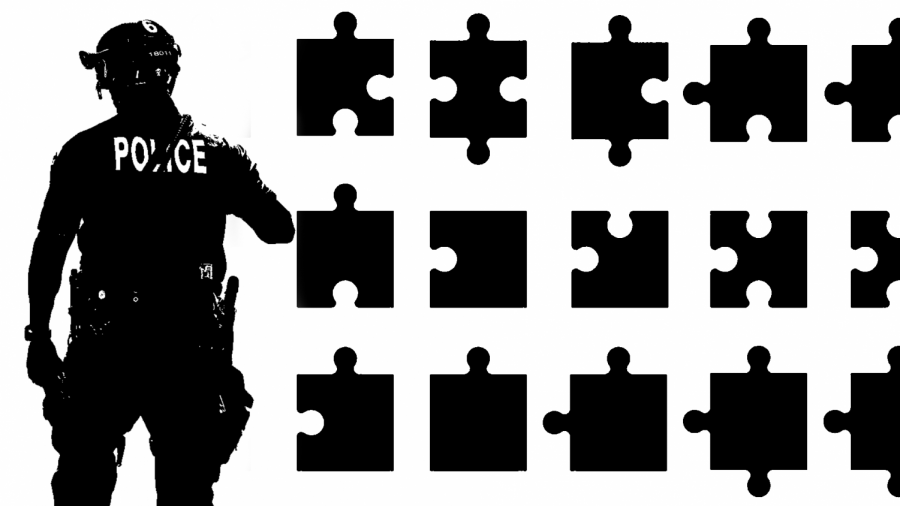Alexander & Kincart: Stop Policing Mental Illness and Neurodivergence
(Design by Piper Armstrong | The Daily Utah Chronicle)
June 23, 2021
Nearly half of the people police officers kill have a mental or physical disability. This grim reality can’t continue. With 1 in 54 Utah children being diagnosed with autism, any police encounters they have will likely result in serious harm. It’s also worth noting that Black disabled individuals have a higher risk of being killed by an officer, given that “the combination of disability and skin color amounts to a double bind.”
As the nation reckons with police brutality and attempts to improve police departments across the country, Utah is taking a step further. Utah Rep. Steve Eliason introduced a bill that mandates police training on autism spectrum disorder (ASD) and crisis intervention for mental illness, which took effect in May. Despite these advancements, police are not fully equipped in handling neurodivergence and need more than just training.
To put it in perspective, there is no shortage of instances where Utah police have mishandled interactions with the neurodivergent and disabled. Last year alone, 40% of the people shot by police were experiencing a mental health event.
For instance, a 13-year-old kid was shot in Salt Lake City following a mental breakdown. The boy, who was evading arrest by running away, did not need to be shot at all. The botched arrest led to an uproar and examination of police abuse with neurodivergence, and eventually, Rep. Eliason’s bill. However, these steps of improvement don’t hinder the fact that Utah police have a history of ableism and brutality against mental illness. It should not take the injury or death of another disabled or neurodivergent individual for police to be properly trained. It’s despicable that it has even come to this.
Under Rep. Eliason’s bill, police will be required to complete neurodivergence and mental health training. This legislation seeks to help police officers differentiate between behaviors indicative of illegal activities (drug use) and behaviors associated with ASD and other mental health crises. However, the bill fails to specify what officers will be learning and any type of measurement to analyze the change in officer behavior and conduct. This vagueness and lack of structure are reasons to be skeptical of the bill’s actual effectiveness.
In Utah, a few police departments are stepping up their game by adopting Project Safeguard, which is an online program promoting “communication and … quick access to important information about a person with a disability.” The program differs from legislation as it offers specific information to the police for a neurodivergent individual, including description, behaviors and known triggers.
Through Project Safeguard, a Crisis Intervention Team (CIT) will be sent out in the event of a mental health crisis. This CIT will be educated and experienced with knowledge surrounding ASD and mental illnesses. Project Safeguard is helping these departments understand autism and mental illnesses, but because only a few are actively participating, there is still work to be done.
For starters, we need to examine disparities in diagnosis. Black individuals are less likely to be diagnosed with ASD than their white counterparts, leading to police mishandling or outright abusing situations with people of color.
Improvements in diagnosis disparity can help facilitate the integration of other preventative measures for police violence. For example, some states are adding an optional license designation for diagnosed communication barriers and health conditions — including ASD. This designation can help police respond to situations and behaviors that may be unfamiliar to them.
There also needs to be better support for disabled individuals so that calling the police isn’t necessary. Specially trained health professionals or social workers should work alongside police officers on mental health crisis calls. The objective should be to de-escalate situations where a person is experiencing a mental health emergency. Addressing disparities in health care is vital to any legislation hoping to combat police abuse in times of crisis.
Above all, continuous training is necessary. A “one-and-done” training on crisis intervention won’t change deeply held perceptions about neurodivergence and mental health conditions. Police seem to be satisfied and feel well equipped in their knowledge of ASD after training, yet autistic individuals report feeling unhappy in their interactions with law enforcement.
Effective training bridges this gap, and clearly, it’s not happening, nor is this bill enough. To make real change, we should decrease interaction between autistic people and the police. Let’s leave these encounters to trained social workers who are better equipped to handle these crises.
c.alexander@dailyutahchronicle.com














Daniel W Kipp • Sep 15, 2021 at 2:10 am
Ok, I am not in Utah (though I was born there). However, I am 42 years old with ASD (and lots of other issues). I also have a B.S. in Psychology. On one hand I agree that law enforcement has issues in dealing with people who have mental illness. On the other though I have a lot of sympathy for law enforcement despite their mistakes.
Before I start in on that though I want to speak to one very important thing “Last year alone, 40% of the people shot by police were experiencing a mental health event.” quotes like this need to be handled more carefully. It seems to say a big part of violent crime is committed by people with mental health issues, which leads people to stigmatize people with mental health as being criminal prone. It disgusts me to see ableism decried on one side, only to have at suggested the mentally ill are a big chunk of the “dangerous enough to be shot” on the other. People with mental health issues which are NOT SELF INFLICTED (like autism) are actually LESS (a lot less) criminally prone than Neurotypicals.
Police deal with the slime of humanity on a daily basis. Those who are not police will likely never know the sheer volume of crud they put up with on a daily basis. A big chunk of this is the result of people who deliberately take mind scrambling substances illegally, and almost all of the ones that do know it’s illegal and don’t desire to get caught. Police are taught to protect themselves and not even a trained professional in the “heat of the moment” can tell with 100% accuracy if someone is tripping or having a mental breakdown. Due to stigma people with mental health don’t exactly walk around with a sign around their neck saying what their issues are with the manual on how to deal with them. So police make a judgement and others get hurt. It’s wrong, but letting someone run off who MIGHT be criminal would get a cop fired. Any solution which fixes this will likely have to be a blanket effect on reactions to all criminal encounters, ones keep officers safe without permanently harming suspects.
That said, I am far more upset with the other side of law enforcement, namely the courts. The numbers of people with mental health issues who are in prison because they cognitively didn’t realize how much trouble they were getting into (like people with autism) is a lot higher than it should be. The culpability of such people are on a totally different scale which the law in many places just simply refuses to recognize. On one hand I know criminals will gleefully exploit any mental health loophole to get out of prison, on the other once people are apprehended time can be taken to make sure (unlike the police who are put in much more high stress positions) arrive at wise position. However, so many die hard prosecutors and judges (who admittedly are human and their job has nothing to do with it) can’t grasp the concepts of people being without what they take for granted.
Life is hard for people with mental health issues. They live their lives fighting a war nobody else sees, which leave no obvious scars, yet every day is a battle for control over their own minds. This issue makes it very hard for everyone (both those with mental health issues and those without) to come to grips with the reality of the situation. People with mental health (or anything) have the same desire as everyone, to be seen as a person first. I have never looked into the mirror and contemplated daily “this is the face of someone with mental health issues.” Unlike a physical disability or even a racial or gender issue people can make snap judgements even looking at themselves regarding how to deal with what is present before them. So, it isn’t hard to understand why those without mental health issues can’t see it either.
I don’t like a lot of things about how the systems are stacked against me. However, ironically I have to constantly fight my own desire to hide within my face to be viewed as everyone else…mental illness free. However, if I do this I have to take the good with the bad. For those on the outside, for loved ones, they want to be fair and see those they care about be given every chance to succeed. Success is good, but for many belonging is more important. For many if they had to choose between their “community” or “life being fair” I reckon most would choose their community.
Like anyone else, I want both. It would be awesome if these problems were fixed. However, changing these problems means changing other’s natures. People who struggle with mental health issues know far better than anyone how hard this is. I would like to see change, but I am patient. I must be. Laws are a grossly poor substitute to changing peoples attitudes compared to social dynamics. Right now, society is in such turmoil we can’t even tell if our leaders are sane or not. “Lift where you stand” ye NT’s, but “do not neglect your own house.” All the victories in the world for those with mental health issues are worthless if were the only ones still standing after the dust clears. Changing the system for the better for EVERYONE helps us as well. Our turn will come eventually.